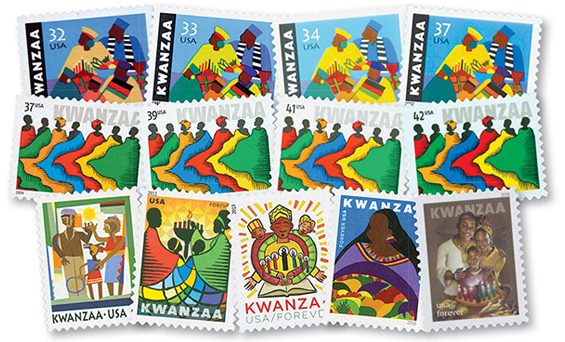Kwanzaa Series

1997 Kwanzaa

2004 Kwanzaa
The seven days and seven principles of Kwanzaa are represented on the 2004 Kwanzaa stamp by seven figures in colorful robes.

2006 Kwanzaa Reissue with 39¢ denomination
The seven robed figures from the 2004 Kwanzaa stamp line up again on this 2006 holiday issue.

2009 Kwanzaa with 41¢ denomination
There are several items common to a Kwanzaa celebration that have special significance. They are the mkeka, a straw mat symbolizing the earth; muhindi, ears of corn that symbolize offspring; zawadi, gifts symbolizing the parents’ work and the rewards of children; kinara, a seven-space candle holder, symbolizing the stalk from which the African people grew; and mishumaa saba, seven candles symbolizing the Seven Principles.

2008 Kwanzaa with 42¢ denomination
On each day of Kwanzaa, one of these candles is lit. The first is the black candle in the center, which symbolizes African people everywhere. Three red candles, representing the blood of ancestors, are on the left. Three green candles, symbolizing the earth, life, and promise for the future, are on the right.

2009 Kwanzaa
On the last night, the youngest child lights all seven candles. The black candle represents the African people, three red candles stand for their struggles, and the three green for growth and the future. Each night, they discuss a principle of Kwanzaa. The seven Nguzo Saba principles reinforce the family and community values important to them as African Americans, including unity, mutual support, creativity, and pride in their unique culture.

2011 Kwanzaa
The focus for the final night is Faith. The family honors their forefathers and commits to working together to triumph over adversity. When the discussion ends, all the candles are blown out to symbolize the end of Kwanzaa.

2013 Kwanzaa
The Kwanzaa stamp shows a man, woman, and child in traditional African clothing celebrating Kwanzaa. The seven candles represent the principles of the holiday. The open book symbolizes knowledge.

2016 Kwanzaa
The 2016 addition to the series pictures a woman holding a bowl of fruits and vegetables, representing the African harvest celebrations that inspired the first Kwanzaa.




